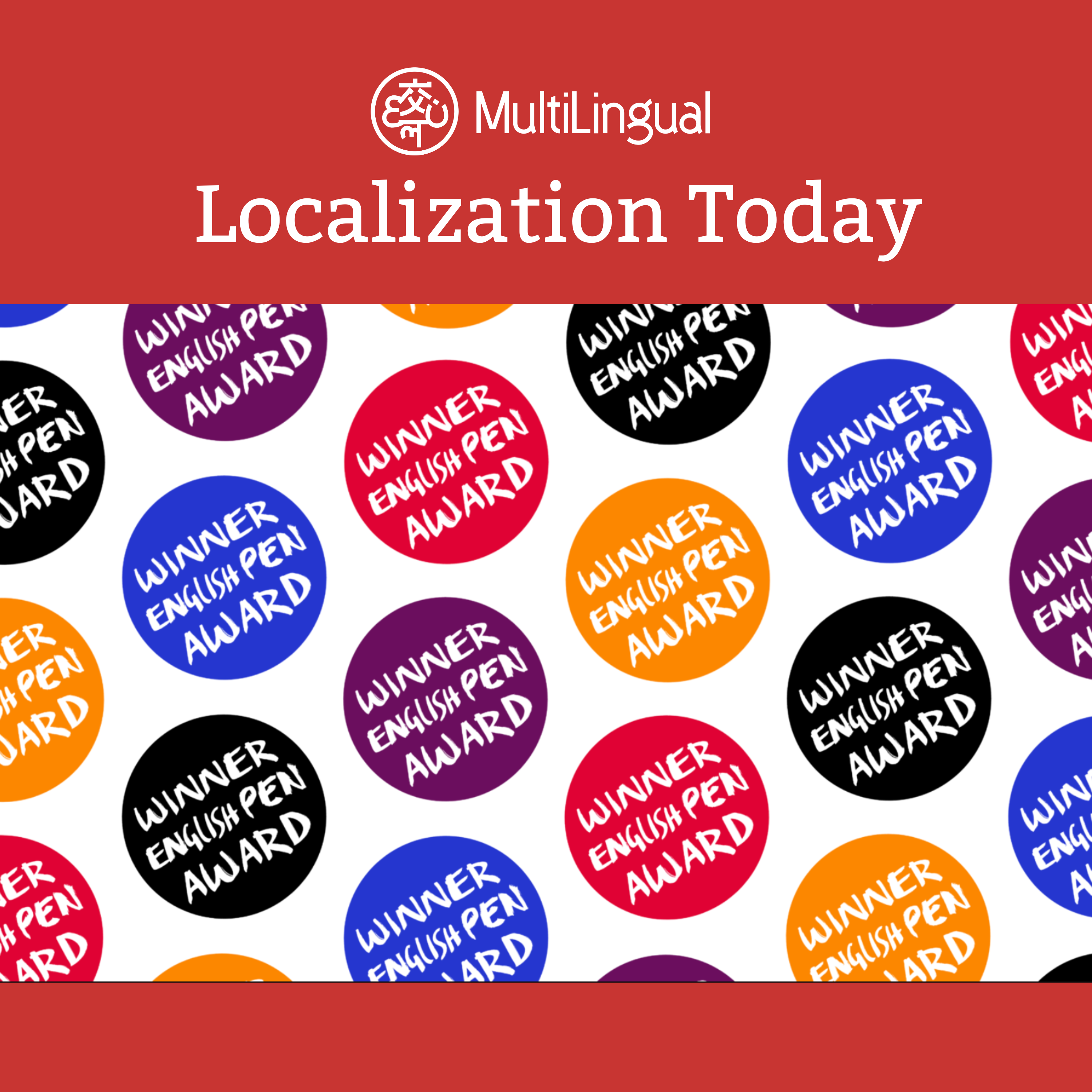Episode Transcript
[00:00:06] Speaker A: This is localization Today, a podcast from multilingual media covering the most relevant daily news in the language industry, why differentiation.
[00:00:16] Speaker B: Is so hard in the language services.
[00:00:18] Speaker C: Space and what to do about it by Lee Densmer and Mimi Moore in.
[00:00:25] Speaker B: The language services space, practitioners and clients.
[00:00:28] Speaker D: Alike note that many companies sound the same.
[00:00:31] Speaker C: They use the same tone of voice.
[00:00:33] Speaker B: Describe their similar services in the same.
[00:00:36] Speaker D: Way, and list the same differentiators. Yet when everyone has such similar differentiators.
[00:00:42] Speaker C: They lose all their meaning.
[00:00:44] Speaker D: So how do language service providers LSPs stand apart?
[00:00:50] Speaker C: And how do global businesses choose an.
[00:00:52] Speaker D: LSP when all their capabilities sound the same? Given these questions, it's important to explore.
[00:00:58] Speaker B: The trouble with common differentiators, understand why a different approach is needed, offer some exercises lsps can do to find their uniqueness, and suggest some criteria by which.
[00:01:09] Speaker D: Global businesses can evaluate lsps.
[00:01:13] Speaker C: If you are a small to midsized.
[00:01:15] Speaker B: LSP or a buyer of language services looking for a vendor who can truly.
[00:01:19] Speaker C: Meet your needs, then read on.
[00:01:22] Speaker D: What are the common differentiators for lsps? When we say common, we mean it.
[00:01:28] Speaker B: In every sense of the word, found.
[00:01:30] Speaker D: Everywhere, shared across companies, and of relatively minor importance.
[00:01:35] Speaker C: That's a hard truth. But let's look at some of these.
[00:01:38] Speaker B: Differentiators to understand why they are common and whether they really shed any light on what a company believes, how they approach work, and what they are like.
[00:01:46] Speaker C: To do business with.
[00:01:48] Speaker D: In the LSP space, you often see.
[00:01:51] Speaker B: These typical business differentiators. Number of languages most lsps assert they.
[00:01:56] Speaker D: Can cover 200 or more languages.
Customized solutions most lsps state that all their solutions are customized based on the client's needs. Partnership approach most lsps offer an approach.
[00:02:10] Speaker B: That is collaborative, communicative, and reflects a.
[00:02:13] Speaker C: Spirit of teamwork with the client, experienced.
[00:02:17] Speaker B: Project and account managers the level of experience of the PMS and AMS is often used as a differentiator to imply higher quality, reliable service.
Use of translation technologies Today, everyone is using translation memory cat tools and most are now using AI translation, whether neural.
[00:02:37] Speaker C: Machine translation and or the newer LLM models.
[00:02:41] Speaker D: All companies are also using translation management.
[00:02:44] Speaker B: Systems TMS platforms to efficiently manage localization workflows and streamline project management, whether it's their own proprietary platform or a platform.
[00:02:54] Speaker C: Of the client's choosing.
[00:02:56] Speaker D: Highly qualified expert linguists most LSPs note.
[00:02:59] Speaker B: That their linguists are highly qualified certified bilingual linguists with university degrees and expertise.
[00:03:06] Speaker D: In specific areas, medical, device, legal, it, and more. These differentiators are all great, and every.
[00:03:15] Speaker B: Client would insist that their LSP have.
[00:03:17] Speaker C: These, so why are they meaningless?
[00:03:21] Speaker B: Consider four reasons.
[00:03:23] Speaker C: They are table stakes every LSP in.
[00:03:26] Speaker B: The industry must have these qualities or they will not be able to compete effectively and do business.
[00:03:32] Speaker D: They do not allow anyone to stand out as unique in any area.
Business to business operations.
[00:03:39] Speaker B: B to B's are only then able to differentiate based on price, which means.
[00:03:44] Speaker C: Language services become transactional.
[00:03:47] Speaker D: They drive an RFP process based on.
[00:03:49] Speaker B: A checklist of features, not on real qualifications or benefits.
[00:03:54] Speaker C: Does your LSP list all of these on their website as differentiators? Don't you want to put forward what.
[00:04:00] Speaker B: Really sets you apart so you can.
[00:04:02] Speaker C: Attract clients who will uniquely want to work with you?
[00:04:05] Speaker D: Differentiation in the language services space requires.
[00:04:08] Speaker C: A different approach in order to grow your business.
[00:04:11] Speaker B: It's time to ask yourself, how does.
[00:04:14] Speaker C: This make us different? And then do the hard work to.
[00:04:17] Speaker B: Get to the root of what makes.
[00:04:18] Speaker C: You stand out the trap of being.
[00:04:21] Speaker B: Everything to everyone many LSPs claim to do everything in language services, translation, interpretation, trans creation, internationalization, on and on and.
[00:04:32] Speaker D: For all verticals in all languages.
Yet being all things to all people makes marketing and selling very hard. Because it's not possible to excel in.
[00:04:43] Speaker B: All areas, your company may be unable.
[00:04:46] Speaker C: To excel in any one area.
[00:04:48] Speaker D: Claiming to do everything dilutes the services.
[00:04:50] Speaker B: You provide and ends up not accurately.
[00:04:53] Speaker D: Describing your services to any of your potential clients.
[00:04:56] Speaker C: The answer to this is often to niche down.
[00:05:00] Speaker D: Niching down is a strategy that focuses.
[00:05:02] Speaker B: On finding a narrower market segment where you can sell your specific services or.
[00:05:07] Speaker C: Products in a more focused, tailored and effective way. It helps you to customize your offerings.
[00:05:13] Speaker B: To resonate with the right buyer, align your marketing to match their needs, and.
[00:05:17] Speaker D: Ultimately drive more sales. A recent article in Forbes on differentiation.
[00:05:22] Speaker B: Points out that standing out among the competition in your marketplace isn't about watching.
[00:05:27] Speaker C: Your competitors and copying them. It's about listening to your target audience.
[00:05:31] Speaker D: And understanding how you solve their problem. There are various ways you can solve.
[00:05:36] Speaker B: A client specific problem by niching down and focusing on one vertical life sciences.
[00:05:42] Speaker C: Legal or gaming are good examples.
[00:05:45] Speaker D: One service trans creation, multimedia, software or.
[00:05:50] Speaker C: Interpretation one approach to your service on.
[00:05:53] Speaker B: Demand translation, machine translation or in person.
[00:05:57] Speaker C: Interpretation one set of languages nordic, asian or african.
[00:06:03] Speaker B: Your mission, in this case the differentiator.
[00:06:07] Speaker D: Is based on why you do what.
[00:06:08] Speaker B: You do, usually aligned with something humanitarian like helping immigrants or people with limited english proficiency, impacting health outcomes, or assisting ngos or cultural institutions further their goals.
[00:06:20] Speaker C: With language services chasing real differentiation, LSPs.
[00:06:24] Speaker B: Can find and craft their differentiators by using a specific discovery process that helps.
[00:06:29] Speaker D: You define the foundational pillars of your brand. This is not an easy or quick.
[00:06:34] Speaker B: Process, but the time invested now to.
[00:06:37] Speaker C: Identify what sets you apart will pay dividends later. First, identify a team to own this initiative.
[00:06:44] Speaker B: Ideally, you include team members with different viewpoints and varying access to clients, sales, marketing, project management, account management and customer success.
[00:06:55] Speaker C: Be sure to include an executive sponsor.
[00:06:58] Speaker B: To champion the cause and help get sea level buy in and a project.
[00:07:01] Speaker D: Manager who can help keep you on track.
Start with the goal of identifying a.
[00:07:06] Speaker B: Minimum of three and a maximum of.
[00:07:08] Speaker D: Five differentiators that really set you apart. Trying to tackle more will risk slipping.
[00:07:14] Speaker B: Back into being repetitive by covering too.
[00:07:16] Speaker D: Much and diluting what really makes you different.
[00:07:19] Speaker C: Here are six areas to look at.
[00:07:21] Speaker B: That will help you get started. Look at your heritage or founding story.
[00:07:25] Speaker C: How and why was your company started? Going back to the company's roots to.
[00:07:29] Speaker B: Identify the original motivators for setting up the company can help you create an origin story and a why that may.
[00:07:35] Speaker C: Help to set your business apart.
[00:07:37] Speaker D: Assess your brand personality what is your.
[00:07:40] Speaker C: Brand like or want to be like? Fun, serious, quirky, authoritative and confident.
[00:07:49] Speaker D: Honing in on these traits helps to.
[00:07:51] Speaker B: Humanize your brand, makes it more relatable, and provides insight into what it is.
[00:07:56] Speaker C: Like to work with you.
[00:07:58] Speaker D: Think about your strategic intent, corporate goals and mission.
[00:08:02] Speaker B: If you can align your mission with what your specific audience is looking for.
[00:08:05] Speaker C: Then your differentiator will resonate with them uniquely.
[00:08:09] Speaker B: For example, if your mission is to bring language access to immigrants and refugees, then your differentiator will resonate with schools.
[00:08:16] Speaker D: And government organizations that work with that population.
[00:08:20] Speaker C: If your strategic intent is to help.
[00:08:22] Speaker B: B two B's connect with customers all over the world, then B two B's.
[00:08:26] Speaker C: With that mission will be naturally drawn to you.
[00:08:29] Speaker D: Take a look at your competitors, review.
[00:08:31] Speaker B: The messaging of your competitors and learn.
[00:08:33] Speaker C: What differentiators are being used or overused. This exercise will help you hone what.
[00:08:39] Speaker B: You don't want your differentiator to be.
[00:08:41] Speaker C: And avoid sounding the same.
[00:08:43] Speaker D: Research your personas and interview clients to.
[00:08:46] Speaker B: Understand how and why they buy.
[00:08:48] Speaker D: You may think you know why your.
[00:08:49] Speaker B: Clients chose you, but how can you.
[00:08:51] Speaker C: Be sure without actually talking to them?
[00:08:54] Speaker B: Sales teams talk regularly to customers and.
[00:08:57] Speaker C: Prospects, so ask them for their insights.
[00:09:00] Speaker B: Then talk directly with your clients and ask them to share with you the.
[00:09:04] Speaker C: Differentiators that matter to them.
[00:09:07] Speaker D: Figure out your ownable points of difference.
[00:09:09] Speaker C: What makes your company unique?
[00:09:11] Speaker D: For example, geographic locations, proprietary technology, or.
[00:09:16] Speaker C: Unique project management processes?
[00:09:19] Speaker D: Answering these questions to identify what makes.
[00:09:22] Speaker B: You unique will require working meetings where.
[00:09:24] Speaker C: You brainstorm and refine ideas. There will be more ideas than you can and should implement. Often.
[00:09:31] Speaker B: Honing in on truly unique and valuable differentiators can be a process of gently letting go of ideas that will not.
[00:09:38] Speaker C: Serve you as you move forward.
[00:09:40] Speaker D: You can also involve a messaging agency.
[00:09:42] Speaker B: That can help facilitate the process.
[00:09:45] Speaker D: Once you choose precise differentiators based on.
[00:09:48] Speaker B: Who you are as a company and.
[00:09:49] Speaker D: The unique ways you serve your market, you will stand out in a sea of sameness.
Stop being all things to all people.
[00:09:57] Speaker C: Align yourself with your ideal buyer.
[00:10:00] Speaker D: Give sales and marketing powerful ways to connect with customers and close sales.
Getting your new message out into the.
[00:10:07] Speaker B: Business world now it's time to market.
[00:10:09] Speaker D: Yourself with your strong differentiators.
[00:10:12] Speaker C: You do this through the content you publish.
[00:10:15] Speaker D: Using content marketing to share your uniqueness.
[00:10:18] Speaker B: With buyers content marketing is the practice of creating useful educational content such as blog posts, ebooks, landing pages or social content that engages your buyers and helps.
[00:10:28] Speaker C: Them decide to buy from you.
[00:10:31] Speaker D: This content is how you share your.
[00:10:33] Speaker C: Differentiation with the world.
[00:10:35] Speaker D: Content marketing activities should include crafting new.
[00:10:38] Speaker B: Messaging with your new differentiators updating your website blogging on topics that show your differentiation creating a lead magnet such as an ebook that talks about your differentiators and why they are important creating solution sheets that can be used to share your differentiators with clients focusing your social content on the areas where you differentiate.
[00:10:57] Speaker C: Yourself enabling your sales team don't assume.
[00:11:01] Speaker B: Your sales team automatically knows how to speak to your clients about your new differentiators and their benefits.
[00:11:07] Speaker D: Creating sales enablement materials that prepare your.
[00:11:10] Speaker B: Sales team to speak to clients help.
[00:11:12] Speaker D: Support consistent messaging about what makes you different. These materials can include cheat sheets on each differentiator and what they mean to the marketplace. Battle cards describing your competitors differentiators and.
[00:11:26] Speaker C: How to compete against them customer facing PowerPoint decks for presentations hold a live.
[00:11:33] Speaker B: Training to present and discuss your differentiators so the sales team deeply understands your differentiators and how to discuss them with prospective customers.
[00:11:41] Speaker C: How B two B's can choose an.
[00:11:43] Speaker B: LSP based on unique differentiators if you are a b two b looking for a language services vendor, you may be struggling to understand how they differ so.
[00:11:52] Speaker D: You can make a good choice for your business.
A lack of differentiation makes it nearly.
[00:11:57] Speaker B: Impossible to choose, resulting in the need for guesswork and intuition, which is no.
[00:12:02] Speaker D: Way to do business.
Having clear differentiators gives you a better.
[00:12:06] Speaker B: Understanding of what the LSP is really good at and helps you find a.
[00:12:10] Speaker D: Partner that is the best fit for your requirements.
[00:12:13] Speaker B: So if a vendor shares only table stakes differentiators, then you will need to dig deeper into where they really add.
[00:12:21] Speaker C: Value, what they believe in, and how they work. Here are some questions you can ask.
[00:12:26] Speaker D: A potential LSP what makes you different from your competitors?
[00:12:30] Speaker C: How can your business best support our global efforts? What is your mission?
[00:12:35] Speaker D: Why does your company do what it.
[00:12:37] Speaker C: Does day after day? Do you have any processes that you think are unique? How do you use technology?
How does your company innovate?
[00:12:46] Speaker D: What specific businesses do you want to.
[00:12:48] Speaker C: Serve, or do you best serve?
[00:12:51] Speaker D: What's next in LSP differentiation?
[00:12:53] Speaker B: These new differentiators will be a north star for everyone in your business, influencing how you do business and aligning yourself.
[00:13:00] Speaker D: Precisely with your target market's needs.
Sales and marketing teams will now be.
[00:13:05] Speaker B: Able to share tangible reasons why clients should choose to partner with you instead.
[00:13:09] Speaker C: Of those with table stakes differentiators.
[00:13:12] Speaker D: B two B clients looking for a language partner will find it easier to.
[00:13:16] Speaker B: Understand what sets you apart and your areas of expertise.
[00:13:20] Speaker D: In the end, precise differentiation benefits the.
[00:13:23] Speaker B: Entire industry by allowing LSPs and buyers to align on the services, values and.
[00:13:29] Speaker D: Approaches that move business forward for both parties.
[00:13:32] Speaker C: It's time to think about whether your.
[00:13:34] Speaker B: Differentiators are table stakes or something more profound and unique. And it's time to buy language services based on approaches, solutions and philosophies that.
[00:13:44] Speaker D: Are an exact fit for your business.
This article was originally published on multilingual magazine, November 2023.
[00:13:52] Speaker A: Thank you for listening to localization today. To subscribe to multilingual magazine, go to multilingual.com.
Subscribe.


